A review of the year: highlights of 2018
Looking back at the University's achievements over the past 12 months.
January 2018: Initiative boosts financial growth
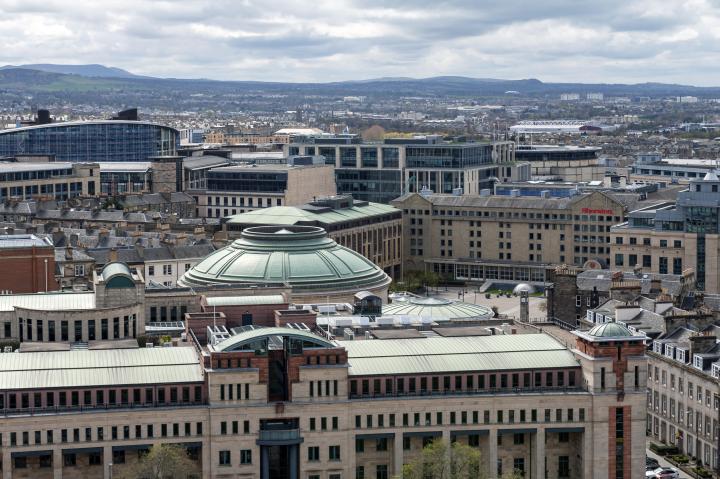
The FinTech Scotland team will focus on bringing together a number of key drivers for growth, including the ideas of entrepreneurs and innovators, the resources of the financial sector, and the economic and social objectives of the public sector.
Dr George Baxter, Chief Executive Officer at Edinburgh Innovations, said: “We’re proud to play a role in the establishment of FinTech Scotland as we pursue Edinburgh’s ongoing strategic commitment to the delivery of skills and talent in this sector.”
February 2018: Committing to a low carbon future

The University announced its plan to complete its transition out of fossil fuel investments within three years. The decision, approved by the University’s ruling body, the University Court, follows the commitment made in 2016 to become carbon neutral by 2040.
Edinburgh is at the forefront of research internationally on climate change and the technologies and policies to mitigate the effects of climate change. It has already invested more than £150 million in low carbon technology, climate-related research and businesses that directly benefit the environment since 2010.
“Climate change is one of the world’s biggest challenges,” said Professor Charlie Jeffery, Senior Vice-Principal. “Over the past few years, we have thought hard about how to respond to that challenge. This change in our investment strategy is a vital step on that journey.”
March 2018: Supporting Modern Apprentices
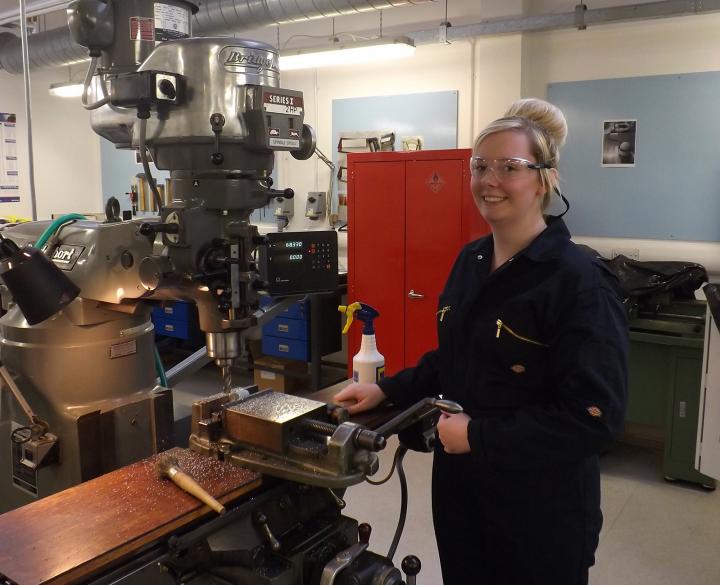
Young people who are gaining a foothold in the world of work at Edinburgh marked their achievements during Scottish Apprenticeships Week in March.
The Modern Apprenticeships initiative enables young people to earn while they acquire the skills they need to succeed in their chosen career. It is a structured programme leading to a qualification accredited by the Scottish Qualifications Authority.
Scottish Apprenticeships Week is a celebration of the benefits that apprenticeships bring to businesses, individuals and the economy.
Each Modern Apprentice receives on-the-job training, often alongside further education. Laura Ferguson (pictured), a Modern Apprentice in Mechanical Engineering in the University’s School of Informatics, who also spends part of her week at Edinburgh College, said: “I feel very involved and supported in my apprenticeship. When I am learning new skills, I enjoy the way that these are shown and explained to me.”
Guidance for recruiters
April 2018: Success at the Commonwealth Games
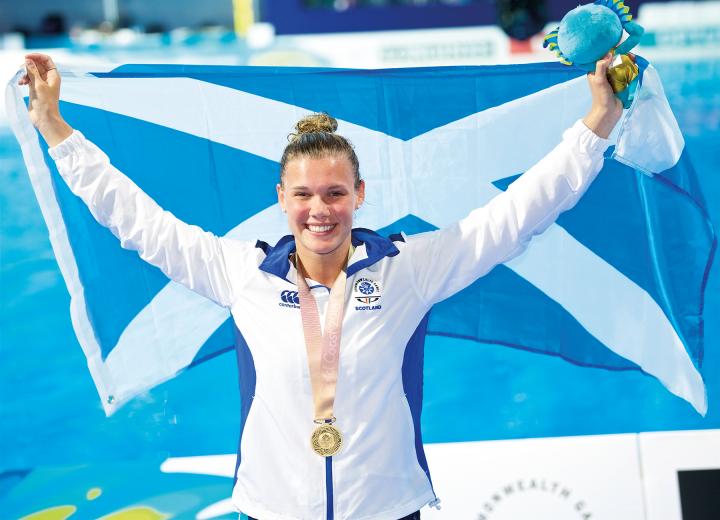
Elite athletes with University links helped Scotland to its most successful overseas Commonwealth Games, in Australia. Leading sports men and women took nine medals, including gold, silver and bronze awards, at the Games. University swimmers and divers excelled in the pool, claiming a total of eight medals in a number of events, while a silver medal was won in the 400-metres hurdles.
Sport science student Grace Reid (pictured) became the first Scottish female diver to win a medal at the Commonwealth Games, taking gold in the one-metre springboard diving.
“Our Gold Coast representatives have been truly inspiring,” said Jim Aitken, Director of Sport and Exercise at the University. “We hope their achievements will encourage everybody to become more involved in sport at some level and to reap the rewards it can bring.”
May 2018: A new sculpture and buildings unveiled at Easter Bush
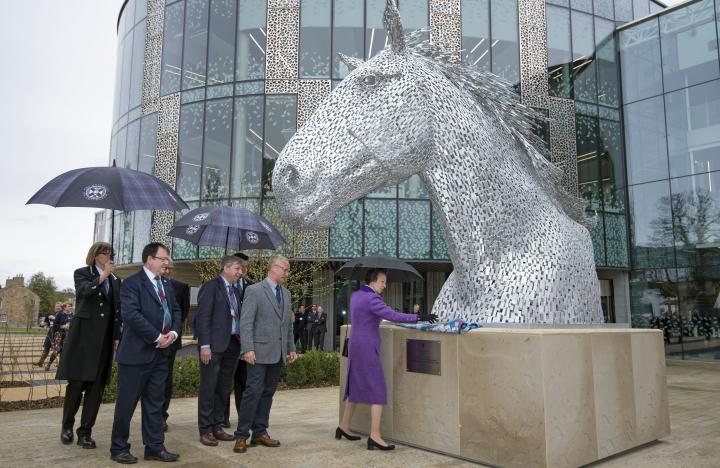
Her Royal Highness The Princess Royal visited the Easter Bush Campus to unveil a 15-foot sculpture titled ‘Canter’ by the creator of ‘The Kelpies’, Andy Scott.
The campus hosts the largest concentration of animal science and welfare expertise in Europe.
The sculpture forms the centrepiece of the entrance plaza to a new hub for staff and students, the Charnock Bradley building. The building is home to the Roslin Innovation Centre, which provides laboratory and office space for animal and veterinary science start-up companies, a gym and the Easter Bush Science Outreach Centre. Her Royal Highness, who is Chancellor of the University and Patron of the Royal (Dick) School of Veterinary Studies, also opened the School’s newly expanded equine hospital.
June 2018: Creating a home for student wellbeing
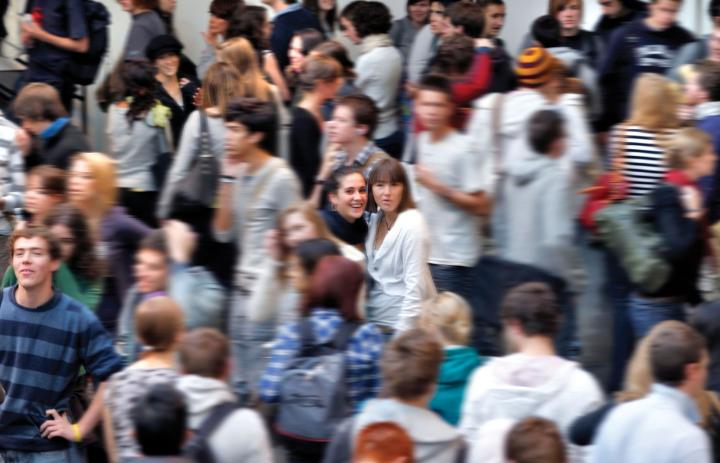
Work began on a new £8 million health and wellbeing hub for students in Bristo Square. The building will see Edinburgh’s Student Counselling and Disability Services brought together with the medical practice and pharmacy for the first time. The building will provide an accessible entrance, a calming wellbeing lounge and consultation rooms.
The Edinburgh University Students’ Association fed into the design process for the new Wellbeing Centre. “It is crucial that students are able to access support while at university and we are excited to see this project going ahead,” said Esther Dominy, 2017 Vice-President (Welfare) of the Students’ Association.
The centre, scheduled to open in late 2019, is part of a £200 million investment over the next eight years in student facilities, which include expanded learning spaces, a major new student centre and enhanced sports facilities.
Health and Wellbeing
July 2018: Friends’ holiday photos give social media users the blues

A survey of Facebook users showed that 90 per cent of people are likely to feel low when they see friends’ travel posts. Researchers from the Universities of Edinburgh, Exeter and Falmouth, and Stockholm School of Economics analysed data from more than 800 people aged 18 to 70 in anonymous online surveys and telephone interviews.
Users born before 1980 said that travel envy motivated them to book a holiday while those born after 1980 were more likely to go on a digital detox or feel motivated to do other things to improve their mood, such as online shopping.
Lead Researcher Dr Ben Marder at the University’s Business School said: “These findings show how those somewhat idyllic posts by friends on social media are likely to make us feel sad in our own lives and take measures to make us feel happier.”
August 2018: Bayes Centre hosts signing of City Region Deal
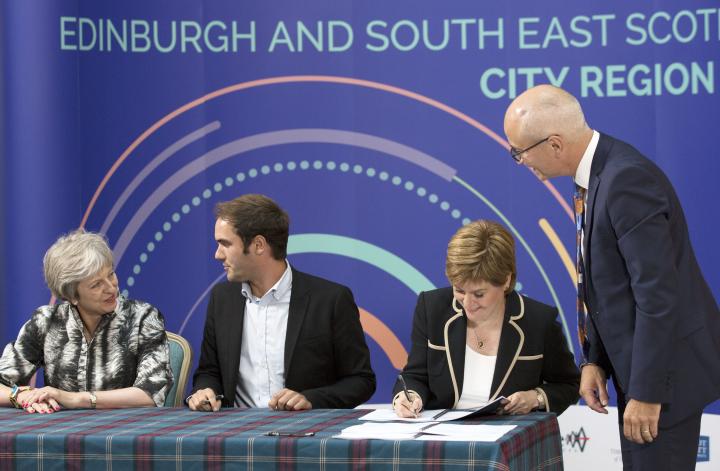
The £1.3 billion investment seeks to improve and grow employability and innovation, transport, housing, culture and skills across the entire region. The University will focus on data-driven innovation in partnership with Heriot-Watt University. Over the next five years, five data innovation hubs will be established across Edinburgh, focusing on using high-speed data analytics to address current issues and challenges.
Professor Peter Mathieson, Principal and Vice-Chancellor, says that the City Region Deal will allow the University’s staff to work on a “range of projects that will tackle the various social and economical challenges in south-east Scotland, and we look forward to working with partners in government and industry to address those needs.”
September 2018: Mastercard Foundation Scholars Program sees fresh intake
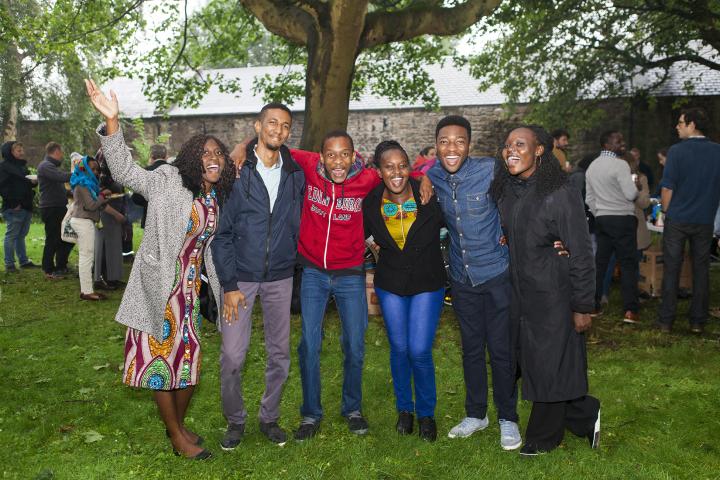
The University welcomed its highest numbers of African scholars this year thanks to its partnership with the Mastercard Foundation Scholars Program. Students travelled from Ethiopia, The Gambia, Rwanda, Sierra Leone and Zambia to begin their studies.
Aisha Janki Akinola, from Nigeria, is studying Architecture: “Getting this scholarship means that I am the first of my ten siblings to study at a University outside of Nigeria. I’m looking forward to improving my leadership skills, learning new things and, above all, developing my career path so I can make a real change in the African continent.”
The $27 million initiative aims to provide scholarships to students in Africa with huge potential but limited educational opportunities. Edinburgh was the first University in Europe to work with the Mastercard Foundation Scholars Program and hopes to inspire a new generation of African leaders. Students will be able to utilise the skills they learn at the University to make a difference when they return home.
October 2018: Physicist recognised for dark energy research
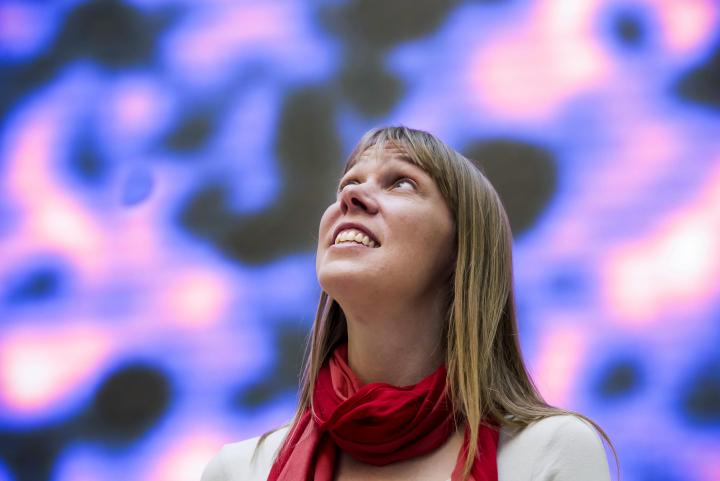
Professor Catherine Heymans, from the School of Physics and Astronomy, received the inaugural Max Planck-Humboldt Research Award for her exceptional work in dark energy. Although three-quarters of the Universe is made from this substance, its origin is still uncertain.
The €1.5 million prize is awarded to a scientist from outside of Germany and hopes to encourage individuals whose research has outstanding potential. The aim is to attract scientists from other countries to a German university or research facility to work with them for a short period.
Professor Heymans’ work observes far distant objects in space. She hopes to find out whether Einstein’s theory of gravity has to be expanded to explain certain phenomena. She plans to use the prize money to set up a team at the Argelander Institute for Astronomy in Bonn, Germany.
November 2018: Global alumni revealed in history project
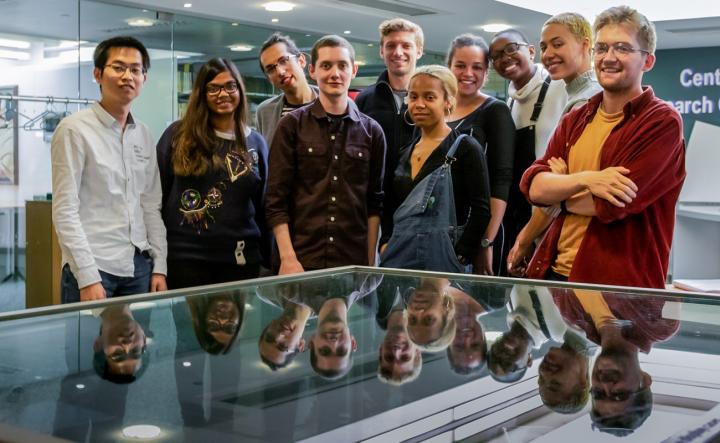
Overlooked stories of the University’s global alumni are being discovered in a new project. Focusing on students from Africa, Asia, the Caribbean and the Americas, UncoverED has revealed a number of stories from between 1800 and 1980. Pictured are two alumni in the Colonial Students' Hostel at 36 Hope Terrace.
Eight students have been working on UncoverED, led by PhD researcher Henry Mitchell and teaching fellow Tom Cunningham and sponsored by Edinburgh Global.
Drawing on resources from the University Library, the National Library of Scotland, biographies, dissertations, local academics and families of the alumni, the group were able to piece together the untold stories of these scholars. These stories will be showcased in an exhibition in the Chrystal Macmillan building, which will run from February until May.
Professor James Smith, Vice-Principal International, said: “With this project we wanted to unearth stories, be they lost, forgotten, or never told. In doing so we can celebrate some of the huge achievements of our black, Asian and minority ethnic alumni.”
December 2018: University agrees winning partnership with FC Barcelona
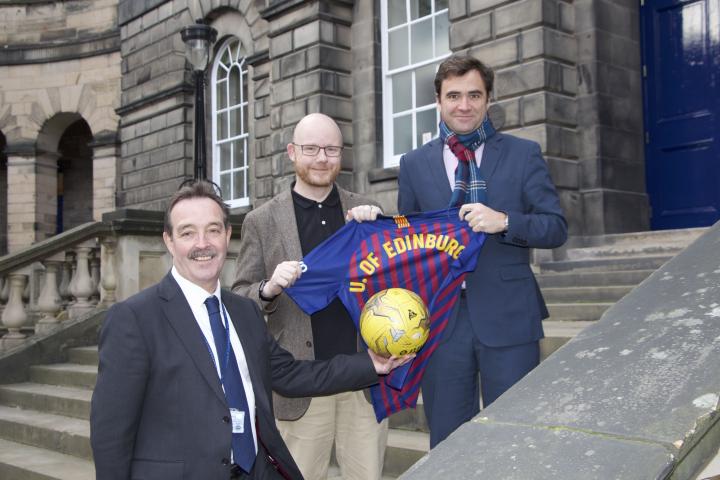
FC Barcelona, one of the most successful football clubs in the world, signed a collaborative agreement with the University. Edinburgh will be supporting and promoting a range of online courses that are offered by the football club. Pictured are Professor Grant Jarvie, Chair of the University’s Academy of Sport, Professor James Smith, the University’s Vice-Principal International, and Javier Sobrino, Head of Strategy and Innovation, FC Barcelona.
Two types of course will be available. One-month courses will present an introduction to topics such as ethics and sports law, while more advanced courses will span over four-months and will include more in-depth topics. These longer courses will explore subjects including sports psychology, facilities management, sports nutrition, and communications.
“Sport is a powerful enabler and by working with FC Barcelona we can reach new communities across the globe,” said Professor Grant Jarvie, Chair of the University's Academy of Sport. “Together, we are determined to use education to enrich and improve people’s lives, wherever in the world they live.”
Univesitas Professional Learning Courses
Photos by BBVA Foundation, David Cheskin, Paul Dodds, Getty Images/Jikgoe/Setsuko N, Neil Hanna, Yao Hui, Rebecca Lee, The University of Edinburgh

